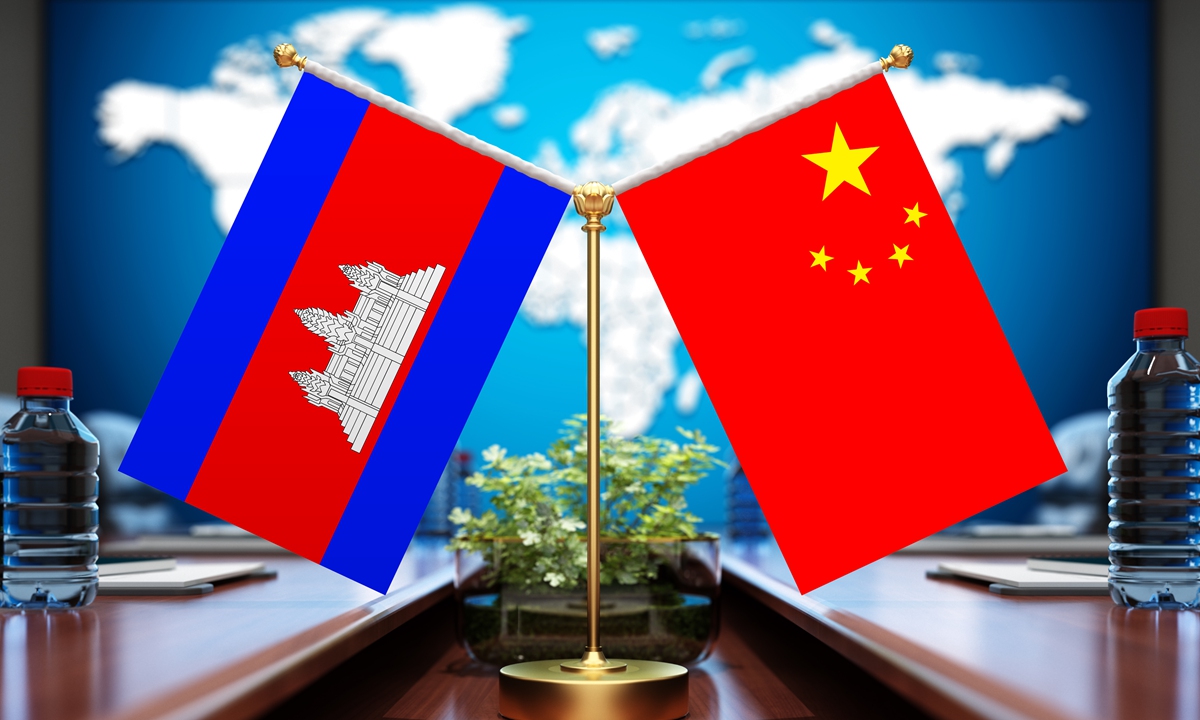China, Cambodia to push cooperation further with PM's visit, with infrastructure in focus

China Cambodia Photo: VCG
The already ironclad relationship of China and Cambodia is expected to progress further, as Cambodian Prime Minister Hun Sen's visit to China starting from Thursday will hopefully result in cooperation in certain infrastructure projects, and as travel resumes between the two nations following China's border reopening.
Being the first overseas prime minister to visit China after the 2023 Spring Festival, Hun Sen came to China around the start of the "Cambodia-China Friendship Year" and the 65th anniversary of the establishment of diplomatic relations, which experts said is proof of the two countries' solid friendship and mutual needs.
According to a report of the Khmer Times in January, many development cooperation projects will be discussed during the three-day visit. In particular, Cambodian officials might seek support from China to build a high-speed railway, the report said.
Cambodia is moving to build a high-speed train system connecting Phnom Penh and its Banteay Meanchey province, which shares a border with Thailand, using a concessional loan from China, reports said. The project's feasibility study has been conducted.
The possible cooperation should add another high-profile project to a pool of infrastructure projects built by Chinese companies in Cambodia. Some are already operating and generating economic benefits for local people, while work on others has just started.
One example is the Lower Sesan 2 Hydro Power dam, which was built and managed by China Huaneng Group. The dam is Cambodia's largest hydropower station and accounts for about one-fifth of the country's annual power generation.
Wang Hailong, who is in charge of public relations for the project, told the Global Times on Thursday that since the station was put into operation in 2008, China Huaneng has trained more than 200 local technicians and managers. The company also created more than 2,000 jobs for local people at the peak of construction.
The project led to the relocation of 840 households and 3,690 poor people in the surrounding area, helping them move to villages with better living conditions, he said.
Huaneng used technologies like smart power plants and remote control as part of the project, he said.
In January, Hun Sen presided over a groundbreaking ceremony for a 45.5-kilometer stretch of National Road 7 being upgraded from two lanes to four. The project was carried out by China Road and Bridge Corp, a Phnom Penh Post report noted.
Gu Xiaosong, dean of the ASEAN Research Institute of Hainan Tropical Ocean University, told the Global Times that well-operating infrastructure projects built by Chinese firms in Asia, like the China-Laos Railway, have provided successful cases for countries like Cambodia.
With better connectivity with its neighbors, Cambodia can develop at a faster pace, Gu said. China-Cambodia trade will also get a strong boost if there's land infrastructure to ship products between the two, presumably via neighboring nations like Thailand.
Wang Xudong, secretary-general of the Cambodia Chinese Chamber of Commerce, told the Global Times on Thursday that after a prolonged war in Cambodia, the country's infrastructure is quite weak. Roads, airports and ports need improvement, and there are hardly any rail facilities.
"China and Cambodia have cooperated in a great variety of fields, especially in infrastructure... there are many hydropower stations in Cambodia, and about 35 percent of roads, as well as important bridges, were built by Chinese companies, with more cooperation likely," Wang said.
Wang Hailong said that Cambodia, which is rich in hydropower, photovoltaic and wind power clean energy resources, needs a complete energy infrastructure network. As China has advantages in power generation, transmission and distribution infrastructure, there's a potential for cooperation.
Cooperation in other sectors is also expected to accelerate, particularly after China reopened its borders around the end of last year.
Wang Xudong said that "Cambodia exports agricultural products such as rice and fruit, as well as mining resources, to China. The country is still developing, and it can use China's advanced products, equipment, technology and professional talent."
Cambodia's Ministry of Commerce aims to set up five Cambodian private business centers in major Chinese cities to promote Cambodian exports, the Khmer Times reported.
Bilateral trade surged 17.5 percent on a yearly basis to $16 billion in 2022, customs data showed.
Moreover, tourism is also recovering at an orderly pace. Cambodia welcomed 125 Chinese tourists from Beijing on Tuesday at the Phnom Penh International Airport. They were greeted by Cambodian Tourism Minister Thong Khon, according to the Xinhua News Agency.

